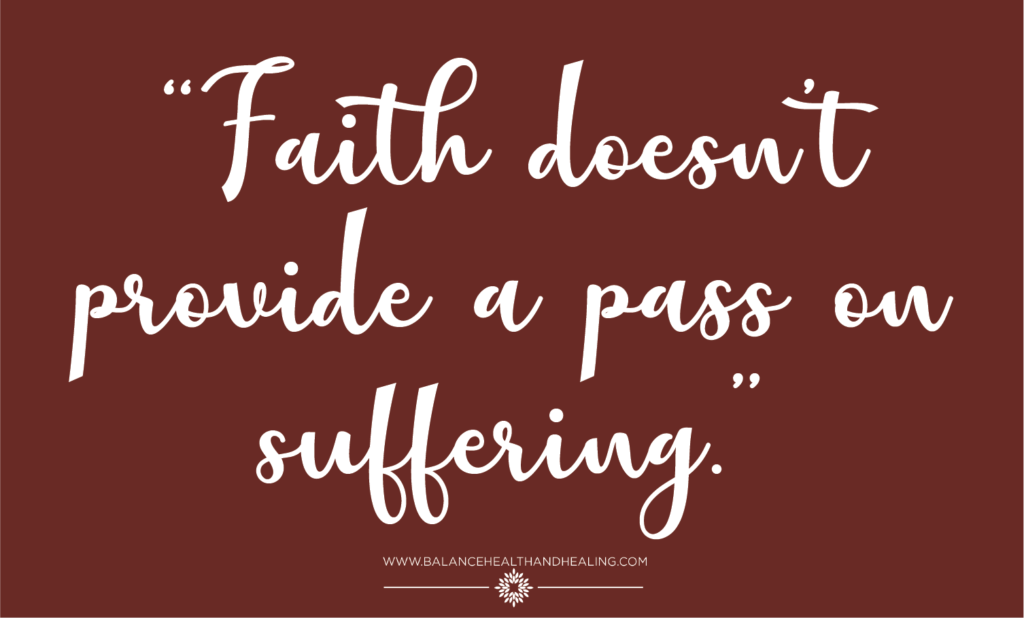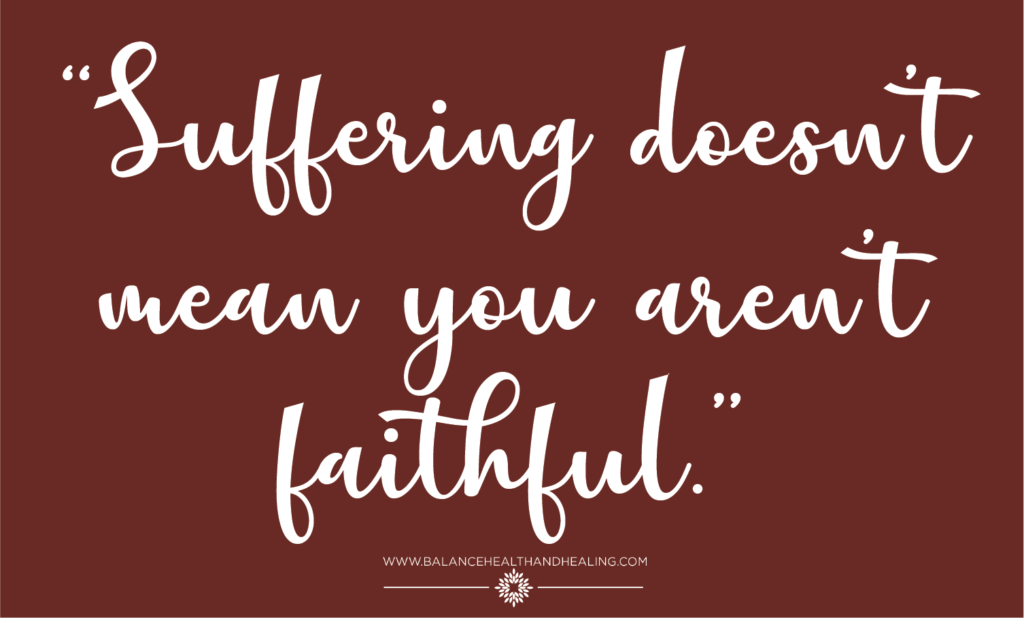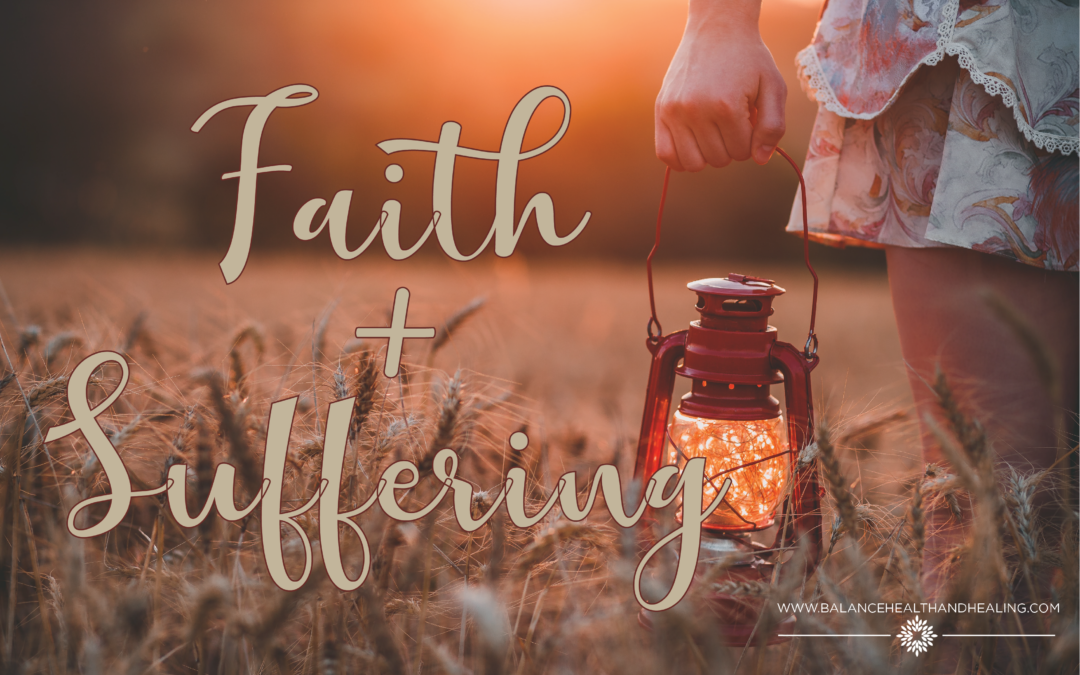A high percentage of the clients I work with identify themselves as faithful, and while we don’t spend much time in therapy discussing an individual’s specific religious beliefs, we do at times talk about the way certain beliefs influence or impact the individual.
 A belief that I’ve noticed myself running into over and over again is one that feels pretty easy to dismiss as soon as it’s called out- but can be running behind the scenes and impacting us in ways we don’t even realize. It’s the belief that “since I am a doing all I can to live out my values as a member of my faith, I shouldn’t be struggling with _____”
A belief that I’ve noticed myself running into over and over again is one that feels pretty easy to dismiss as soon as it’s called out- but can be running behind the scenes and impacting us in ways we don’t even realize. It’s the belief that “since I am a doing all I can to live out my values as a member of my faith, I shouldn’t be struggling with _____”
This belief can hang us up in a lot of different ways. It can make us feel additional shame or guilt for personal shortcomings. Imagine putting into that blank your challenging behaviors- addiction, a temper, or your difficulty in a relationship with a loved one; or challenging life circumstances- a difficult diagnosis, abuse, or trauma.
“I am a believer, I absolutely shouldn’t be struggling with pornography. Something has to be wrong with me.”
“I have always tried to be good. Why was I abused as a child?”
“I actively try to be a good member of my church, why do I chronically struggle with reeling in my temper and reactivity to others? What does everyone else know that I don’t?”
“I’m a stalwart believer. Why has God allowed this diagnosis to come to me?”
“I’m serving in a prominent leadership position at church, I shouldn’t be struggling with resentment and thoughts of leaving my husband. No one else in my shoes would be having these thoughts.”
Can you see how this belief can take an already challenging personal situation and dial it up a notch? It can often accompany (or really, swing wide open the backdoor for) additional limiting or isolating beliefs.
While you may not be experiencing any of these specific situations, we all encounter struggle as part of our existence- it’s just one of those universal things that comes to all of humanity, although not in equal measure. As you think about your own challenges in life, can you see this way of thinking making an impact? What challenges would you fill in that blank with?
One of the ways we look at this belief in therapy is to check on the underlying assumptions. Does x mean that y will happen? Does faithfulness equal an easy life? Does a belief in God spare me from difficulty and challenges?
belief in God spare me from difficulty and challenges?
When broken down in this way, most of us are able to easily answer that no, faith does not and has never meant an easy road ahead. In fact, scriptures, religious histories, and lives of those around us are full of examples to the contrary!
When we are believers who are also suffering, this underlying belief can bring an added measure of sorrow when it runs unchecked. On top of the kinds of thoughts already discussed, it can also appear in thoughts of, “Wow, I really must be a terrible person to have to go through this.” or “I must be wrong/unrighteous/unworthy because ______ has happened to me”.
At times, it can also show up in a belief that our “righteousness” can control a situation. This is really tempting during challenges that bring a sense of being out of control- ANY control then seems so comforting, until it goes completely sideways on us.
“I will do everything possible to be a “good mom”, and then I’m sure my daughter will overcome her drug problem.”
“I can busily serve my family and neighbors to such a high degree that the pain of my husband’s death will go away.”
It’s hard to step back and acknowledge- that even for the faithful, believing people in the world- we are living in a world without guarantees. In fact, do you feel downright depressed contemplating that with me? Does it seem easier to pick up the illusion of control rather than face obstacles with a level of acceptance?
It’s natural. It takes a lot more introspection, intentionality- and dare I say, faith- to stop controlling, avoiding, denying, and to accept and decide to move forward regardless.
I don’t hold it to be true that faith was ever meant to prevent, stop, or control suffering. I do believe, however, that our faith can provide us with some meaning in our struggle and allow us to continue to move forward with purpose.
Faith doesn’t provide a pass on suffering. Suffering doesn’t mean you aren’t faithful.
The next time you find yourself facing difficulty and notice some of those limiting beliefs about your faith and suffering popping up, take a step back and observe. When we see more clearly, we can move forward more surely. We can choose to move forward with more meaning, more purpose- and even more faith.

